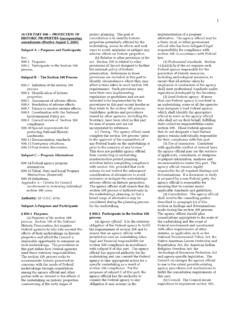Transcription of Why Should We Restrict Immigration? - George Mason …
1 5 Why Should We Restrict Immigration? Bryan CaplanConsider the following thought experiment: Moved by theplight of desperate earthquake victims, you volunteer to work as arelief worker in Haiti. After two weeks, you re ready to go , when you arrive at the airport, customs officials tellyou that you re forbidden to enter the United States. You go to theAmerican consulate to demand an explanation. But the officialresponse is simply, The United States does not have to explainitself to you. You don t have to be a libertarian to admit that this seems like amonstrous injustice.
2 The entire ideological menagerie liberals, con-servatives, moderates, socialists, and libertarians would defendyour right to move from Haiti to the United States. What s so badabout restricting your migration? Most obviously, because life inHaiti is terrible. If the American government denies you permissionto return, you ll live in dire poverty, die sooner, live under a brutal,corrupt regime, and be cut off from most of the people you want toassociate with. Hunger, danger, oppression, isolation: condemningyou to even one seems wrong.
3 Which raises a serious question: if youCato Journal, Vol. 32, No. 1 (Winter 2012). Copyright Cato Institute. Allrights Caplan is Professor of Economics at George Mason University andResearch Fellow at the Mercatus Center. He thanks Larry Caplan, MichaelClemens, Tyler Cowen, Robin Hanson, Michael Huemer, Garett Jones, JohnNye, Alex Tabarrok, and EconLog readers for comments and discussion, andZachary Gochenour for excellent research assistance and detailed 12/29/11 2:02 PM Page 56 Cato Journalhad been born in Haiti, would denying you permission to enter theUnited States be any less wrong?
4 1 This thought experiment hardly proves that people have anabsolute right of free migration. After all, many things that seemwrong on the surface turn out to be morally justified. Suppose youknock me unconscious, then slice me open with a knife. This isnormally wrong. But if you re performing surgery required to savemy life, and I gave my informed consent, then your action is not just morally permissible, but praiseworthy. Nevertheless, mythought experiment does establish one weak conclusion: immigra-tion restrictions seem wrong on the surface.
5 To justifiably restrictmigration, you need to overcome the moral presumptionin favorof open borders (Huemer 2010).How would one go about overcoming this presumption? Forstarters, you must show that the evils of free immigration are fairlysevere. immigration restrictions trap many millions in ThirdWorld misery. Economists consensus estimate is that open bor-ders would roughly double world GDP, enough to virtually elimi-nate global poverty (Clemens 2011). The injustice and harm thatimmigration restrictions prevent has to be at least comparable tothe injustice and harm that immigration restrictions hard evidence that immigration has major drawbacks is notenough.
6 The proponent of immigration restrictions also has toshow that there is no cheaper or more humane way to mitigate theevils of immigration . Surgery wouldn t be morally justified if a $1pill were an equally effective treatment. Why not? Because evenif surgery will save the patient s life, there is a cheaper, morehumane way to do rest of this paper examines the alleged evils of immigrationthrough this moral lens. In each case, I begin with a balanced sur-vey of the relevant social science. The point is not to determinewhether immigration has good overall effects.
7 The point, rather, isto determine whether any of the effects of immigration are badenough to credibly overcome the moral presumption in favor ofopen borders. After reviewing the social science, each section then1 You might claim that life in Haiti isn t nearly as bad for Haitians, because at leastthey have their families with them. But suppose your relief mission included yourrelatives. Would you feel better if the government denied your whole familypermission to return, rather than you alone?32739_Ch02_Caplan_19016_Cato 12/29/11 2:02 PM Page 67 Why Should We Restrict immigration ?
8 Turns to a deeper question: assuming the worst about immigration ,are immigration restrictions the only viable remedy? If cheaper,more humane alternatives exist, then immigration restrictionsremain unjustified even if my summary of the social science ishopelessly American Workers?The most popular argument for immigration restrictions is thatwe need them to protect American workers from poverty. Themechanism is simple: Without these laws, the supply of laborwould drastically increase and American wages would plummetto Third World of the assumptions behind this argument are true.
9 Afterthe highest-growth decade in the history of the world (Chandy andGertz 2011, Maddison 2009), billions remain desperately a billion people live on the equivalent of a dollar a day orless (Collier 2007). About a quarter of the world s populationwould like to permanently move to another country (Torres andPelham 2008). Contrary to populist complaints, current immigra-tion restrictions clearly achieve their intended purpose: excludingalmost all of the people who want to move here. Without immigra-tion restrictions, the supply of labor in the United States wouldrapidly these assumptions do not imply that American workers owetheir standard of living to immigration restrictions.
10 Under openborders, low-skilled wages are indeed likely to fall, but mostAmericans are not low-skilled. Over 87 percent of Americans overthe age of 25 are high-school graduates ( Census Bureau2011). Most of the world s would-be immigrants are, at best, sub-stitutes for American high-school estimates confirm this point: immigration has little orno effect on overallwages. Educated Americans are primarily cus-tomers, not competitors, of new arrivals. As Kerr and Kerr (2011: 12)explain in their state-of-the-art literature survey:The documented wage elasticities are small and clusterednear zero.








